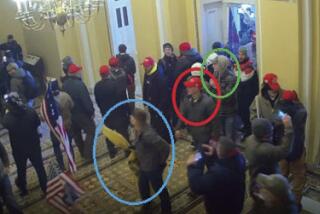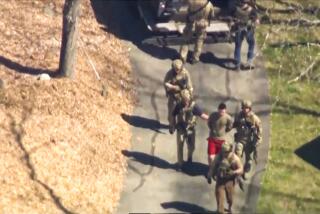2 More Marine Guards Tied to Security Breach
- Share via
WASHINGTON — Two more Marine guards at the U.S. Embassy in Moscow have been implicated in the widening probe of security breakdowns there, and the Pentagon is looking into whether similar problems exist at other American posts in Soviet Bloc countries, it was disclosed Friday.
Reps. Les Aspin (D-Wis.) and Daniel A. Mica (D-Fla.), at separate congressional hearings, said that two more Marines may have violated the rule against fraternizing with Soviet citizens, but the legislators had no information that those guards were involved in actual espionage.
Cites Government Source
Aspin, chairman of the House Armed Services Committee, said that his information came from a government official, whom he declined to name, and that “the two might have been acting together, like Lonetree and Bracy.”
2 Charged With Espionage
He was referring to Sgt. Clayton J. Lonetree and Cpl. Arnold Bracy, who have been charged by the Marine Corps with espionage and conspiracy for allegedly acting in concert to allow Kremlin spies to roam through sensitive embassy areas after business hours. Both Marines had become sexually involved with Soviet women working at the embassy, officials have said.
Another Marine guard, Staff Sgt. Robert S. Stufflebeam, was also arrested on suspicion of fraternizing with Soviet women “on several occasions” and was flown Friday from Camp Pendleton, Calif., to the brig at Quantico Marine Base in Virginia, where Lonetree and Bracy are being held in solitary confinement.
Neither Aspin nor Mica, chairman of the House Foreign Affairs subcommittee on international operations, disclosed the names of any new suspects. But Mica said he was concerned that the security breach at the embassy might be “very much bigger than we thought” because “the scope and numbers involved is widening.”
The entire 28-member Marine detachment in Moscow is being rotated home to Quantico for questioning in the investigation.
The Defense Department said that the investigation has been expanded significantly to include Marine guards “and other military personnel assigned now and previously to U.S. establishments in (Soviet Bloc) and other selected countries.”
The department said in a statement that “this worldwide investigation” is being conducted by 70 special agents and polygraph examiners of the Naval Investigative Service. The Marine Corps is a branch of the Navy.
“The highest priority has been assigned, and all required resources are being made available to the (investigative) task force,” the Pentagon said. “The task force will be enlarged as necessary to ensure prompt investigation.”
Began Last December
Officials said that the wider probe began last December without announcement after disclosure of the Lonetree case. The inquiry is intended “to prepare prosecutive cases against any Department of the Navy personnel involved in criminal misconduct, including any espionage and related offenses, and to identify the full extent of any damage to national security caused by these offenses,” the statement said.
Officials declined to elaborate on who is being given polygraph examinations.
At the House Armed Services Committee hearing, Aspin asked Maj. Gen. Carl E. Mundy Jr., the Marine Corps director of operations, about the involvement of other Marines. “I have no information whatsoever,” Mundy replied.
The State Department and the Naval Investigative Service referred all questions to the Marine Corps, but Maj. Tony Rothfork, a spokesman, said that he had no information to support the allegations.
Mundy told the committee that Marine Corps and State Department officials are studying options to tighten security in the guard program at overseas embassies. He said suggestions have included the use of older, more experienced or married Marines to replace the generally young and single guards there. But he added that such changes could cause hardships on Marine families when the guards are assigned to middle-of-the-night or weekend duty.
Rep. Patricia Schroeder (D-Colo.), referring to Lonetree and Bracy, told Mundy: “My guess is that, if either one of these guys had had a spouse, you would have heard about this a lot earlier.”
Comment Draws Chuckles
Rep. William S. Broomfield (R-Mich.), vowing tough response to the sexually tainted espionage case, drew chuckles when he said sternly that “the Soviets need to understand we won’t take their aggressive spying lying down.”
Mundy, in response to a suggestion from Schroeder, said that the Marines might deploy women guards at some overseas posts. But finding suitable housing separate from the men’s barracks could be a problem, he said.
At the Foreign Affairs subcommittee hearing, Mica said that he and Rep. Olympia J. Snowe of Maine, the panel’s ranking Republican, will travel to Moscow this weekend to examine U.S. security problems.
Snowe said she was advised that communications code machines at the embassy have been so compromised that Secretary of State George P. Shultz, when he visits the Soviet capital April 13 for talks on arms control, will be “reduced to negotiating foreign policy in a Winnebago.”
President Reagan, asked by reporters about Snowe’s remark after a photo session in the White House, said of Shultz: “Well, I hope he’s got one with him.”
State Department sources confirmed that Shultz is being supplied with a special van to help protect the confidentiality of his messages in Moscow.
‘Winnie-the-Pooh’ Slate
Mica said he and Snowe were told to use a “Winnie-the-Pooh” erasable slate to make remarks to each other or to U.S. officials on their five-day visit. He held aloft a red child’s slate to show how words and phrases can be erased by lifting the cellophane cover.
At the White House, spokesman Marlin Fitzwater said President Reagan had asked his Foreign Intelligence Advisory Board in 1981 to study the problem of “intelligence penetration of our embassies.” Fitzwater said several reports from the board have made various recommendations since then and that one result was a decision by Reagan two years ago to reduce the size of the Soviet staff at the embassy.
State Department spokesman Charles E. Redman said U.S. officials also decided two years ago to exclude Soviet citizens from construction work on a new office wing of the American Embassy, fearing that hidden electronic devices might be planted there. The building project is still incomplete.
Soviet Staff Reduced
The department began to reduce the number of Soviet nationals working in the embassy long before Soviet leader Mikhail S. Gorbachev prohibited all Soviet citizens from being employed there late last year in retaliation for a U.S.-ordered reduction of Soviet diplomats in the United States, Redman said.
He added that after-hours Marine guard patrols also were increased in 1985--ironically about the time that Lonetree and Bracy are believed to have begun their nighttime espionage activities.
Staff writers Norman Kempster and James Gerstenzang contributed to this story.
More to Read
Sign up for Essential California
The most important California stories and recommendations in your inbox every morning.
You may occasionally receive promotional content from the Los Angeles Times.









